Photographs: Courtesy: Kalpesh Bhatt Arthur J Pais
'Suddenly you become part of a very large humanity.' Bathing in the Ganga at the Maha Kumbh Mela left a lasting impression on Harvard investigators, finds Arthur J Pais.
Tarun Khanna, the Jorge Paulo Lemann Professor at Harvard Business School, and director, South Asia Institute, Harvard University, was at the Maha Kumbh to study the business side of the Mela, but as a Hindu he would not think of returning to the campus without a dip in the Ganga. 
"I did not worry about pollution," he tells India Abroad. "I took the dip and felt wonderful about it."
His colleague from Harvard's Graduate School of Design, Professor Rahul Mehrotra, also enjoyed the experience.
"It was a moving experience," he says. "I don't think it was my own religious beliefs as much as the collective will to do this that made me take the dip."
Please ...
'The dip was like a charge passing through the body'
Image: A Sadhu prays as he takes a dip during the first "Shahi Snan" at Kumbh Mela in AllahabadPhotographs: Ahmad Masood/Reuters
"We took a boat out to a point a little away from the banks. I was with four or five very close friends, so it was memorable for us to be together for the occasion."
"The water was clean, cold and the dip, more than anything was incredibly refreshing -- like a charge passing through the body."
"I guess having grown up as a Hindu this ritual was embedded deep in my sensibility and imagination and the feeling of some inner satisfaction was what I felt. More importantly, it was a moment that memories of my father and my grandparents surfaced in a very powerful way. It was experience that was enveloped in a very peaceful feeling!"
It is hard to find many out of the 50 Harvard investigators who did not take a dip.
Please ...
'Being at the Kumbh was an eye-opening experience'
Image: Naga Sadhus raise their arms while shouting religious hymns on the banks of Ganga after taking the holy dip at Kumbh Mela in Allahabad.Photographs: Adnan Abidi/Reuters
Harvard Divinity School's Professor Diana L Eck is not a Hindu, but she feels close to the Ganga and took a dip near a small river island, which is not very crowded.
She says the love she has for the Ganga and thoughts about its importance in Indian spiritual and religious life passed through her mind during the immersion.
Oscar Malaspina, like his friend Felipe Vera, is not a Hindu, but they both took a dip.
"Being at the Kumbh was an eye-opening experience," Malaspina says, "its landscape challenged any idea I could have imagine about a massive camp. It was a real city, an ephemeral city that we all have the privilege to see. It was amazing to see millions of pilgrims populating the city and coming from so far for one single religious act."
"On the last day, I had the feeling that I should take a dip in the Ganges (sic) and I did."
Please ...
'I found the city much cleaner than what you would expect'
Image: Devotees cross pontoon bridges spanning the river Ganga during the a 'Shahi Snan' at the Kumbh Mela.Photographs: Ahmad Masood/Reuters
Vera, an exchange student at Harvard from Chile, has been to India several times, and is familiar with the health challenges. But taking a dip in the polluted Ganga did not worry him.
"Oscar had a huge problem in his articulations (breathing) and the last day he decided to go to the river just for getting better. Since that he has been felling much better! That was a powerful thing!"
Vera found many things to admire at the Kumbh.
"While the size of the Mela is mindboggling, I found the city much more clean and neat than what you would expect."
The Kumbh's surprisingly orderly feel is a result, he believes, not just of the pilgrims' respect for the sacred space, but also of the city planners' decision-making: the roads, the public toilets, and the casual but pervasive presence of 10,000 policemen.
Pooja Agrawal, MD MPH, who is a part of the Department of Emergency Medicine, Yale University School of Medicine and an associate faculty, Harvard Humanitarian Initiative, was at the Maha Kumbh studying the potential spread of contagious diseases.
The Ohio-born Agrawal, who has lived in America all her life, could not resist bathing in the Ganga.
Please ...
'Faith matters'
Image: A devotee gestures after bathing in Ganga during the Kumbh Mela.Photographs: Ahmad Masood/Reuters
"Faith matters," she says. "And I felt very good about it. Suddenly you become part of a very large humanity."
But the pollution of the Ganga remained a concern.
Isaac Dayno, an undergraduate on the trip, had a question at Swami Chidanand's ashram: Would there come a point where the Ganga's significance would diminish as the river becomes more polluted?
He remembers what Sadhvi Bhagawati Saraswati, an America-born woman who studied at Stanford and serves as the Swami's right hand, said: 'If your mother fell in a sewer ditch, would you hesitate to help her up? There would never come a moment when you wouldn't love her, when you wouldn't lend her your hand. I can't imagine the Ganga ever getting to a point where the faithful don't bathe.'

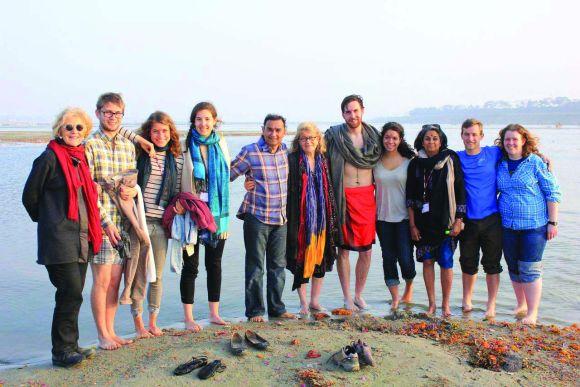
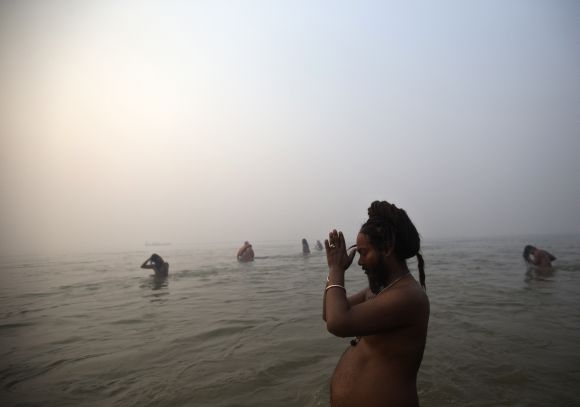
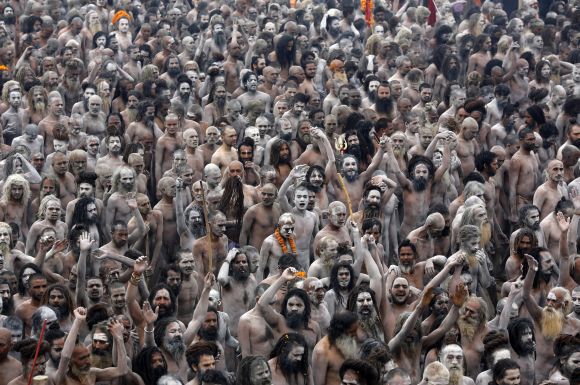
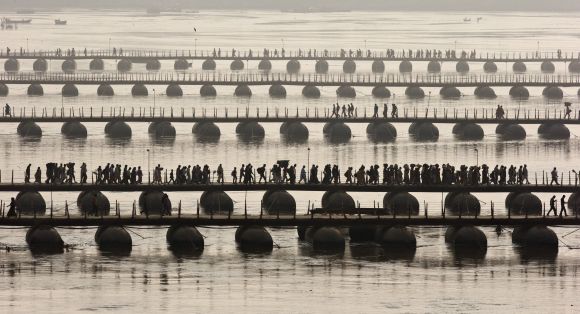
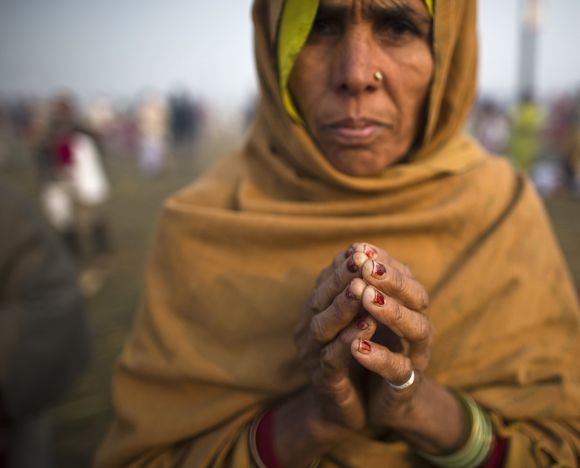
article